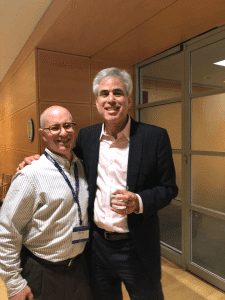Ethics is Good Business
(Originally posted on the Engagious Blog.)
![]()
Good Ethics is Good Business: Jonathan Haidt at BSPA
Every year behavioral psychology’s best and brightest (and those who aspire to be) gather at the Behavioral Science & Policy Association (BSPA) conference to drop knowledge, meet people, and learn new things. This year’s conference was in Washington, DC and Engagious was there.
In attendance were authors, analysts, policy makers, and researchers. And those applying the research. Like the attendee from CVS who uses behavioral insights to provide better health outcomes for customers. Or like those who use behavioral insights in message testing and refinement. (That’s us.) We have been attending for years and always leave with fresh approaches to apply to our message refinement projects—whether they are around policy or around commerce. We have found that the learnings apply across the spectrum.
Topics included health, energy, business, the environment, financial decision-making, and education. The format was dense with content and fast-paced, with keynotes, lightning rounds, and a chance to work in a small group on a policy challenge.
We picked up some useful insights and met some interesting people. For instance, NYU-Stern School of Business professor Jonathan Haidt was a featured presenter. He’s probably best known for his work on the moral foundations of politics, and his efforts to foster more civility in political discourse (now there is something we can all agree upon!) The Righteous Mind. See also NY Times Review and moralfoundations.org.
We’ve found his insights incredibly useful, and we’ve been deploying them for years. According to Haidt’s research, if a person is strongly motivated by the moral foundations of caring and fairness, for example, it makes sense to speak to him/her in that language. It doesn’t make sense to appeal to authority. (“Socrates said so” is not a good response to “It isn’t fair!”)
Haidt offered an overview of Ethical Systems, a collaboration of researchers and faculty at business schools who share the conviction that good ethics is good business. Basically they want to tear down the wall that separates ethics research from the ethics offices, which apparently spend a lot of time on compliance and almost no time on actual ethics.
The culture of an organization is “how we do things around here.” The “ethics personality” is that culture in relation to ethics. A strong ethical culture is one that supports good ethical decisions and behavior by all members of that organization. Haidt et al. maintain that a company’s organizational structure can often nudge its members to take (un)ethical shortcuts; but a system-wide commitment to ethics can reduce ethical failure. Which turns out to be best for business. Who knew? 😉
( You can check out ethicalsystems.org for more information about this venture.)
Check out our post on political and policy messaging best practices.
Interested in applying behavioral science to your message testing and refinement? Reach out and let’s talk.
